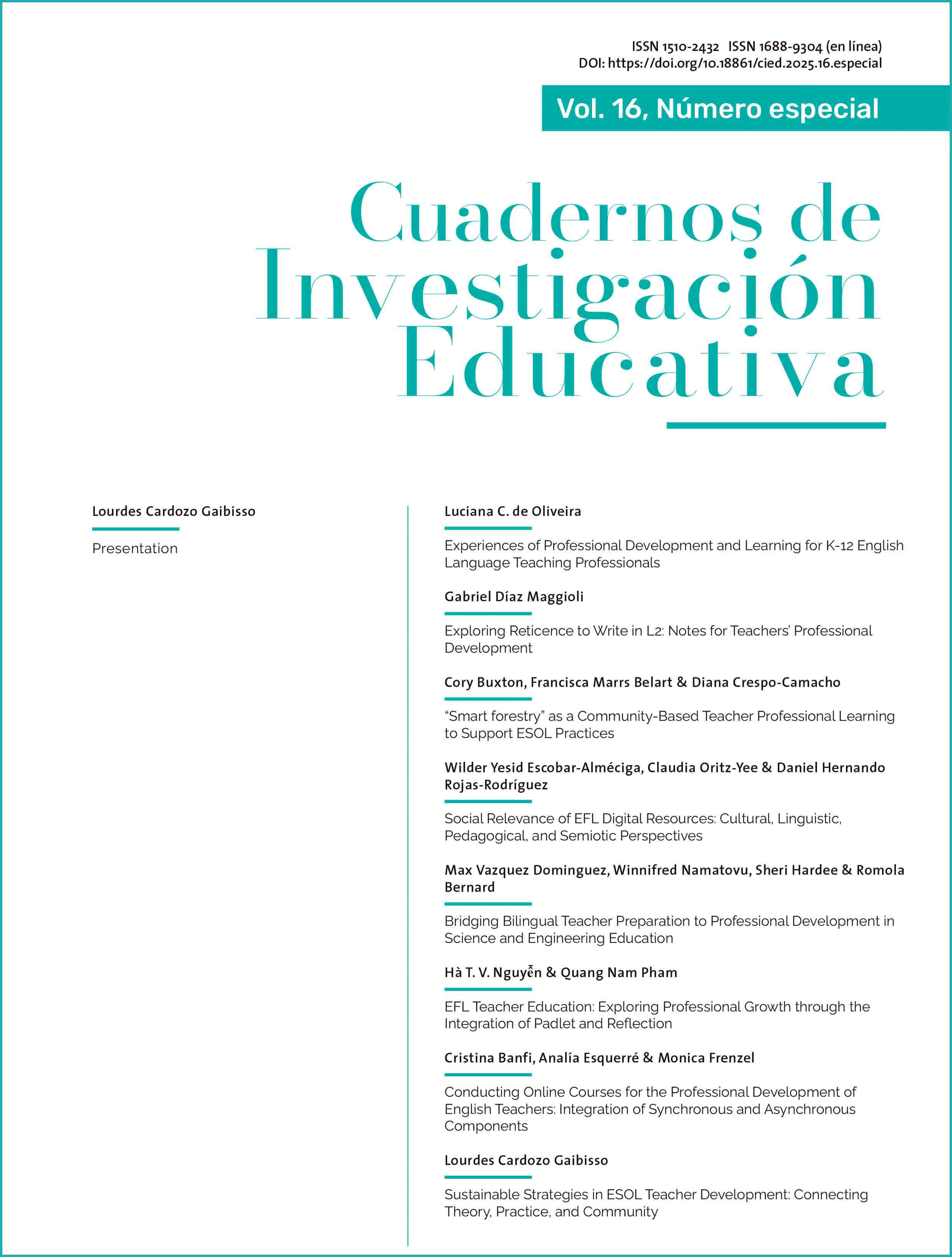Exploring Reticence to Write in L2
Notes for Teachers’ Professional Development
DOI:
https://doi.org/10.18861/cied.2025.16.especial.4119Keywords:
EFL writing instruction, student writing reluctance, teacher perceptions, curriculum, foreign language educationAbstract
Developing writing proficiency is essential to communicative competence in foreign language learning, yet Uruguayan public secondary students frequently display reluctance toward writing in English, as noted by their teachers. This study investigates EFL teachers’ perceptions regarding student engagement in writing, aiming to determine the prevalence and underlying causes of the identified reticence, as well as the instructional practices teachers employ to address it. Utilizing a descriptive, survey-based approach, the study collected 58 responses—about 5% of Uruguay’s public EFL teaching population—via an electronic questionnaire. The instrument comprised both multiple-choice and open-ended questions to enable quantitative and qualitative analysis. Results reveal that 52.8% of teachers view students as generally reticent to write in English, while 47.2% observe partial reluctance. Contributing factors include students’ low confidence, restricted vocabulary, inadequate early exposure to writing, and lack of engagement with tasks perceived as irrelevant to their interests. While 94% of teachers dedicate class time to writing, many highlight time constraints and curricular requirements as significant barriers to adopting a more systematic approach. The process approach to writing (47%) is the most widely implemented methodology, followed by the product approach (11.7%), with just 5.8% using a genre-based approach. Notably, 11.7% of teachers report unfamiliarity with any writing pedagogy. The findings underscore the need for greater emphasis on process- and genre-based writing instruction in EFL classrooms. Future research should examine the effectiveness of specific pedagogical interventions, explore student perspectives on writing reluctance, and consider the role of teacher training in improving writing outcomes in EFL contexts.
Downloads
References
Administración Nacional de Educación Pública (ANEP). (n.d. a). Inglés - DGES: Programa de Educación Media Superior. Dirección General de Educación Secundaria. https://www.anep.edu.uy/sites/default/files/images/Archivos/programas-ems/finales/tab-1/Ingl%C3%A9s%20-%20DGES.v3.pdf
Administración Nacional de Educación Pública (ANEP). (n.d. b). Inglés - Tramo 5: Programa de Educación Básica Integrada. Dirección General de Educación Secundaria. https://www.anep.edu.uy/sites/default/files/images/te-programas/2023/finales/espacios/espacio-comunicacion/Ingl%C3%A9s%20-%20Tramo%205_final.pdf
Badger, R., & White, G. (2000). A process genre approach to teaching writing. ELT Journal, 54(2), 153-160. https://doi.org/10.1093/elt/54.2.153
Bayat, N. (2014). The effect of the process writing approach on writing success and anxiety. Educational Sciences: Theory & Practice, 14(3), 1133–1141.
British Educational Research Association (2018). Ethical guidelines for educational research (4th ed.). https://www.bera.ac.uk/researchers-resources/publications/ethical-guidelines-for-educational-research-2018
Brisk, S. (2006). Language, Culture, and Community in Teacher Education. Routledge.
British Council. (n.d.). Product and process writing: A comparison. https://www.teachingenglish.org.uk/professional-development/teachers/knowing-subject/articles/product-and-process-writing-comparison
Bryman, A. (2012). Social Research Methods. Oxford University Press.
Chen, J. (2023). Exploring imitative learning in a blended EFL writing class. ELT Journal, 78(3), 356-368. https://doi.org/10.1093/elt/ccad039
Creswell, J. W., & Creswell, J. D. (2018). Research design (5th ed.). SAGE Publications.
Cummins, J. (1981). The role of primary language development in promoting educational success for language minority students. In California State Department of Education (Ed.), Schooling and language minority students: A theoretical framework (pp. 3-49). Evaluation, Dissemination and Assessment Center, California State University.
Díaz Maggioli, G. (2024). New Directions in Language Teaching. Grupo Magró Editores.
Dörnyei, Z., & Taguchi, T. (2010). Questionnaires in Second Language Research: Construction, Administration and Processing. (2nd ed.). Routledge.
Ellis, R. (2022). Does planning before writing help? Options for pre-task planning in the teaching of writing. ELT Journal, 76(1), 77-90. https://doi.org/10.1093/elt/ccab051
Gibbons, P. (2009). English Learners, Academic Literacy, and Thinking: Learning in the Challenge Zone. Heinemann.
Halliday, M. A. K., & Matthiessen, C. M. (2004). An Introduction to Functional Grammar. Routledge.
Hayik, R. (2023). Engaging writing in the Arab EFL classroom. ELT Journal, 77(2), 156-169. https://doi.org/10.1093/elt/ccac038
Hyland, K. (2003). Second language writing. Cambridge University Press. https://doi.org/10.1017/CBO9780511667251
Jiang, D., & Kalyuga, S. (2022). Learning English as a Foreign Language Skills in Collaborative Settings: A Cognitive Load Perspective. Frontiers in Psychology, 13. https://doi.org/10.3389/fpsyg.2022.932291
Mackey, A., & Gass, S. M. (2016). Second Language Research Methodology and Design (2nd ed.). Routledge.
Martin, J. R. (2009). Genre and Language Learning: A Social Semiotic Perspective. Linguistics and Education, 20(1), 10-21.
Mehrabi, N. (2014). The effect of second language writing ability on first language writing ability. Theory and Practice in Language Studies, 4(8), 1719–1726.
Moon, J. (2008). L2 children and writing: A neglected skill? ELT Journal, 62(4), 398-400. https://doi.org/10.1093/elt/ccn039
Raftari, S., & Abbasvand, M. (2023). Product, Process, and Genre Approaches to Writing: A Comparison. Iranian EFL Journal, 9(5), 75-85.
Suastra, M., & Menggo, S. (2020). Empowering Students’ Writing Skill through Performance Assessment. International Journal of Language Education 4(3) 432-441. https://doi.org/10.26858/ijole.v4i3.15060
Yasuda, S. (2011). Genre-based tasks in foreign language writing: Developing writers' genre awareness, linguistic knowledge, and writing competence. Journal of Second Language Writing, 20(2), 111-133. https://doi.org/10.1016/j.jslw.2011.03.001
Zamel, V. (1987). Recent Research on Writing Pedagogy. TESOL Quarterly, 21(4), 697-715.






